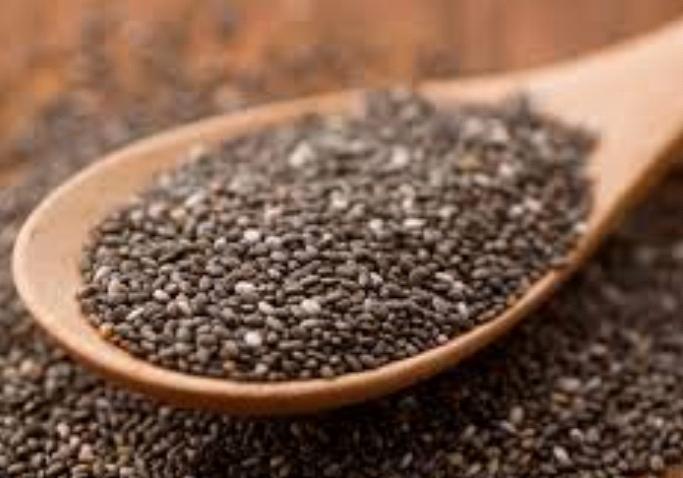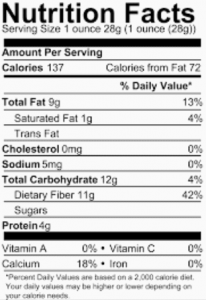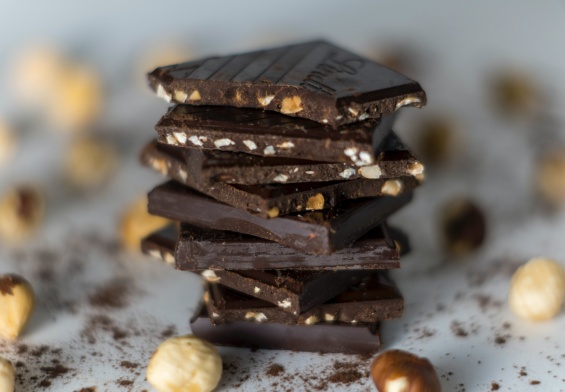 Chances are, the mere mention of the word “chia” as in “chia seeds” will bring a giggle or two to those who fondly remember a gift called a “Chia Pet” first introduced in the early 1980s. (https://en.wikipedia.org/wiki/Chia_Pet) The novelty of the Chia Pet or Chia Head was that you had a terracotta planter and you affixed moistened chia seeds onto it, and in a few weeks’ time, the chia seeds sprouted and made “hair”. Chia pets are still available and enjoyed a recent resurgence with chia seeds sprouting into full beards to resemble various characters from the “Duck Dynasty” show.
Chances are, the mere mention of the word “chia” as in “chia seeds” will bring a giggle or two to those who fondly remember a gift called a “Chia Pet” first introduced in the early 1980s. (https://en.wikipedia.org/wiki/Chia_Pet) The novelty of the Chia Pet or Chia Head was that you had a terracotta planter and you affixed moistened chia seeds onto it, and in a few weeks’ time, the chia seeds sprouted and made “hair”. Chia pets are still available and enjoyed a recent resurgence with chia seeds sprouting into full beards to resemble various characters from the “Duck Dynasty” show.
But chia seeds are good
Chia seeds are not just a novelty item and have been around for a long time. They come from the desert plant Salvia hispanica, a member of the mint family, and are sold under its common name “chia” as well as several trademarked names. They are believed to have originated in Central America where the seed was a staple in the ancient Mayan and Aztec diets for centuries. But in these modern times, they are touted for their health benefits and are a rich source of nutrients and antioxidants. There are a variety of ways to use chia seeds, all designed for you to reap the benefits of this incredible seed, among them sprinkling them in your cereal, enjoying them in your yogurt or adding them to flour for baking. The more the merrier because here are some of the many benefits of chia seeds:
Omega-3 fatty acid – time and time again you hear nutritionists talking about Omega-3 fatty acids and how important they are as antioxidants in thwarting inflammation, enhancing cognitive performance and reducing bad levels of cholesterol. Chia seeds are rich in antioxidants that help protect the body from free radicals, aging and cancer. Those high antioxidant levels helps them have a long shelf life; they last almost two years without refrigeration
Fiber – for those who suffer with bowel issues, one means of helping to “get you on track” or to achieve regular bowel function is by introducing chia seeds to your diet. They are an excellent source of fiber, containing 10 grams of fiber in only two tablespoons. This is one-third of the recommended daily intake of fiber per day.
Minerals – the recommended daily intake of chia seeds is just two tablespoons and this small amount provides a plethora of valuable minerals, like calcium, phosphorus, magnesium and manganese, all valuable nutrients that help you prevent hypertension and maintain a healthy weight, and are important for energy metabolism.
Satiety – Chia seeds give you satiety, or the feeling of being full and satisfied, which helps minimize food cravings between meals. This is because of a combination of protein, fiber and the gelling action of chia seeds when mixed with liquids which all combine to give this effect.
Gluten-Free – With so many people on a gluten-free diet these days, chia seeds contain NO gluten or grains, so are an excellent choice for a gluten-free diet, and, they may be just mixed in with other foods, unlike flaxseeds for example, which must be ground up to obtain the nutrient benefits.
May be used as a replacement for eggs – For those folks who are monitoring their cholesterol intake, chia seeds can be used to replace eggs. The outer layer of chia seeds swells when mixed with liquids to form a gel which can be used to increase the nutrient content of foods and baked goods but as an egg substitute. To make the egg replacement, mix 1 tablespoon of chia seeds with 3 tablespoons of water and let sit for 15 minutes.
Lowers LDL, or bad cholesterol levels, and increases HDL, or good cholesterol levels – Chia seeds can modulate and regulate cholesterol levels without the need for prescription medications.
Regulates blood sugar – For diabetics, regular use of chia seeds can reduce insulin resistance and decrease abnormally high levels of insulin in the blood.

Benefits of chia seeds
Chia seeds are a simple way to achieve health benefits and infuse nutrients into your body. Sprinkling them into yogurt is a quick-and-easy way to enjoy the health benefits, or, a more-common means is making chia pudding. It take a little more effort, but by making the pudding and pairing it with the chia seeds, you are getting more calcium than a serving of milk, more antioxidants than eating blueberries and more omega-3 than eating salmon.


